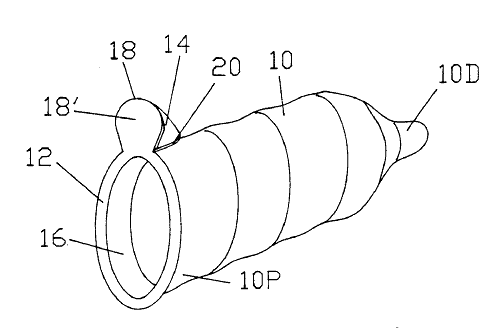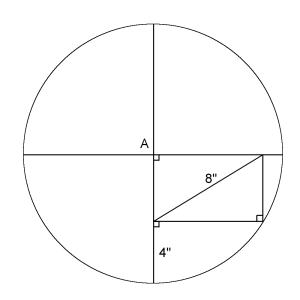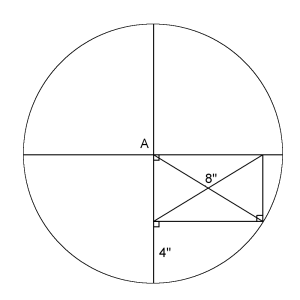56 + 46 + 86 + 86 + 36 + 46 = 548834
A Little Night Music

Everyone clamors for musical birth control, but no one does anything about it. No one, that is, until Paul Lyons, who offered this pressure-activated musical condom in 1991. The patent abstract promises it’s amusing, entertaining, unusual, and “capable of producing a surprise effect.”
The music or voice message may be played once (e.g., an overture or melody may be played for about 20 seconds), or it may be repeated continuously for several minutes to coincide with the duration of coitus.
What to play? That’s up to you — Lyons recommends the 1812 Overture, “The Ode to Joy” from Beethoven’s Ninth Symphony, “Happy Birthday to You,” “The Anniversary Waltz,” or “any popular love song.”
A Wide Vocabulary
Doug Nufer’s 2004 novel Never Again is aptly named — in 202 pages he never uses the same word twice. Here’s the first sentence:
When the racetrack closed forever I had to get a job.
And here’s the last (and the moral):
Worldly bookmaker soulmates rectify unfair circumstance’s recurred tragedies, ever-moving, ever-hedging shifty playabilities since chances say someone will be for ever closing racetracks.
It’s an example of an Oulipo exercise in constrained writing — here’s another.
The Royal Scam
Sir Walter Raleigh once made a wager with Elizabeth that he could weigh the smoke from his tobacco pipe.
When she accepted, he weighed his tobacco, smoked the pipe, and then weighed the ashes that remained.
The queen paid him. “I have seen many a man turn his gold into smoke,” she said, “but you are the first who has turned his smoke into gold.”
Round Numbers
Unquote
“Moreover, the satellites of Jupiter are invisible to the naked eye, and therefore can exercise no influence over the Earth, and therefore would be useless, and therefore do not exist.” — Astronomer Francesco Sizzi, on Galileo’s claim to have seen the moons of Jupiter
Ill-Starred

For stewardess Violet Jessop, bad luck came in threes. In 1911 she was working on the RMS Olympic when it collided with a British warship off the Isle of Wight.
A few months later she took a position on the Titanic, which sank famously in the North Atlantic in 1912. Her lifeboat was picked up by the Carpathia.
And in 1916 she was working as a nurse on the hospital ship Britannic when it struck a mine in the Aegean Sea and went down.
By this time she was philosophical. Though the Britannic sank in less than 50 minutes, she took care to rescue her toothbrush, “because there had always been much fun at my expense after the Titanic, when I complained of my inability to get a toothbrush on the Carpathia. I recalled [my brother’s] joking advice: ‘Never undertake another disaster without first making sure of your toothbrush.'”
After that her bad luck ceased. She lived without incident for another 55 years and died of heart failure in 1971.
Figures
294 miles south of Paradise, Michigan … is Hell, Michigan.
Garage Talk
In 1950, General Motors condensed the sounds of car trouble into seven types:
- The Rattle. A series of hard, sharp sounds in rapid succession, like a hard object being shaken around in a metal container. This noise usually indicates a loose or broken part striking against another.
- The Thump. A dull sound, generally made when a soft part strikes against a hard part. An example is the noise made by a deflated tire on the road.
- The Squeak. A sharp, shrill, piercing noise, generally made by two dry metal parts rubbing together. The sound may be sharp and erratic, or drawn out — a squeal. Lack of lubrication causes many squeaks.
- The Grind. This is a continuous crushing sound like a part being crushed between two revolving parts. Such a sound might come from the transmission.
- The Knock. This is a sharper and more distinct sound than a thump. It’s generally associated with a loose rod or crankshaft bearing. (Not to be confused with the “knock” or ping of a laboring engine.)
- The Scrape. A grating or harsh rubbing sound, often made by two pieces of material rubbing together. The sound of a dragging brake could be described as a scrape.
- The Hiss. This is like escaping air or steam or the sound of water on a hot metal part.
The idea was to simplify conversations between mechanics and customers. “Besides telling what the noise is, the driver is expected to report where it comes from and when it happened,” explained Popular Science. “With this report, the mechanic has a good start toward learning why it happened.”
Tickets, Please

At the Kishi railway station in southern Japan, the stationmaster has her own litter box. Tama, a local stray cat, was named to the post in January 2007, and ridership immediately jumped 17 percent.
She’s paid in cat food and gets her own hat; as the station is unmanned, her main job is to greet passengers.
This all sounds remarkably progressive, but Tama may have mixed feelings: She’s still the only female manager in the company.


